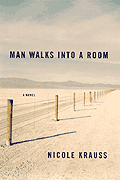
by Sonia Isard
The Spin Cycle: Man Walks into a Blurb
Hi again, and welcome back to The Spin Cycle, Lilith’s online forum for media analysis. Looking forward to hearing your thoughts!
 Say you’re a man. Say you’re an Israeli man. Say you’re an Israeli man writing a novel in Hebrew. Say the novel’s about a woman. Say you’d like some people to buy your book. Who writes your blurb?
Say you’re a man. Say you’re an Israeli man. Say you’re an Israeli man writing a novel in Hebrew. Say the novel’s about a woman. Say you’d like some people to buy your book. Who writes your blurb?
I was taken aback over the weekend when I read on the Guardian’s book blog about some recent writing from Nicole Krauss. Not about her new novel, or a rehash of her “Twenty Under Forty” short for the New Yorker, but about a blurb she wrote for David Grossman’s new novel. A blurb?
The Guardian, a massive British news outlet, found Krauss’s blurb “strikingly effusive,” and, apparently, pretty hilarious. “Our challenge for you today is to outdo Krauss,” the moderator urges, inspiring tons of comments parodying Krauss.
I’d expect this kind of gleeful snark from the gossip blogs, where mockery is the money-maker. But here we have the intersection of the old media Guardian meeting its new media offspring, meeting serious literature, meeting a publishing industry that is literally dying to sell its books in print.
A few bloggers came to Krauss’s defense, so there is that, I guess. But I keep going back to the strange confluence of dynamics that turned this tiny blurb into a full-on news story. There’s the gender piece mixed up with the hierarchy piece—I doubt anyone would have jumped on Grossman for writing enthusiastically on the back of Krauss’s book. And there’s the Jewish piece—anytime someone revels in mocking a Jewish woman’s expressiveness, I’m a little wary.
And what about the whole international aspect? I once had a professor tell me that the first thing she reads on college recommendation letters is the name of the recommender, to see if it’s an overenthusiastic American or a presumably dour and dry recommender from pretty much anywhere else in the world. Maybe Americans still just don’t get British humor.
The Guardian quotes Paul Auster (yes, another Jew) as writing: “Flaubert created his Emma, Tolstoy made his Anna, and now we have Grossman’s Ora.” This, I think, helps clear up some of the confusion. Grossman, yet another man, writing a woman character—in this day and age, maybe publishers think they need a woman to place her seal of approval. And the fact that an American Jewish woman was selected to write the blurb (or at least, the blurb that got the biggest reaction) highlights all the tensions of writing a Jewish novel in a language not English, for an audience that hopefully extends beyond the Jewish literary sphere.
All in all, a bizarre little snippet of media frenzy, with a talented Jewish woman at the center of this highly localized maelstrom. I sure hope at least somebody gets some book sales out of it.
-Sonia Isard